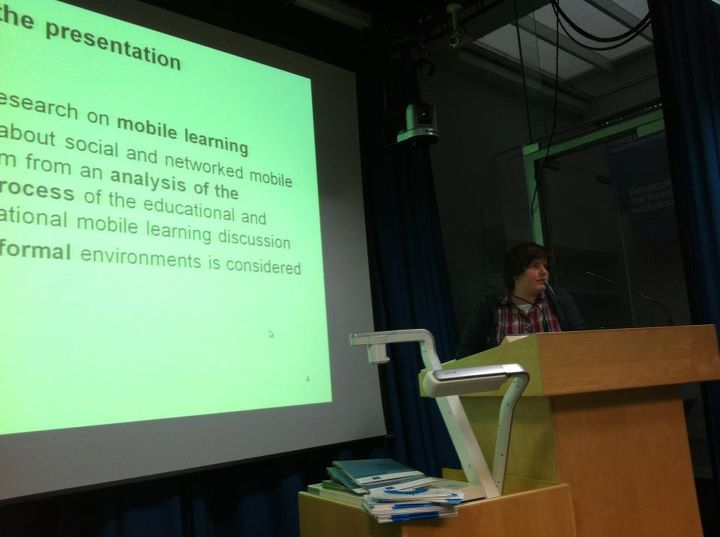On Monday, 21 November 2011 I gave a presentation at the SoMobNet Roundtable, IoE London, about social and networked learning from the perspective of the mobile learning discussion. Title of the presentation was “Mobile Learning – Potential and controversies embodied in a young scientific field and arising consequences for future research and practice with view to social, networked and (informal) learning”. The slides are available here via the Cloudworks page of the SoMobNet Roundtable, the extended version of the abstract can be found below as well.
Mobile Learning – Potential, Controversies and Implications ….
Abstract
Mobile Learning – potential and controversies embodied in a young scientific field and arising consequences for future research and practice with view to social, networked and (informal) learning
Keywords: heuristic and hermeneutic analysis, scientific process, methodology, practice, theory
Mobile Learning is a relatively young discipline, which already has – in some European countries more than in others – a stable standing in both, the scientific discussion and fields of practice. However, even if the mobile learning field seems to be a booming area that generates lots of ideas and future scenarios on how teaching and learning could or should be realised by using mobile and convergent technologies: the reality is often not as innovative and progressive as enthusiasts and advocates of the discipline want people make believe. This applies not only to theoretical approaches but also – and especially – to the practice realised in formalised learning contexts such as school. An analysis of the process of the mobile learning discussion in the U.K. and the German speaking countries Germany, Austria and Switzerland gives evidence to this fact. [1] This analysis which considers the scientific process of the mobile learning discussion, mobile learning practice and methods for the implementation of mobile learning practice in formalised contexts allows to draw conclusions which have relevance not only for the current practice of mobile learning, but that also gives hints on which aspects should be focused by future research and on ways how (informal aspects of) mobile learning should be implemented in formalised contexts without ignoring the learners’ agency, cultural practices, expertise and knowledge.
The paper is structured in three parts:
- The first part focuses on the structure of the scientific process of the British and German speaking mobile learning discussion by considering central papers, projects and definitions. It will point out contexts, practices as well as phases and development lines that are relevant for and arising from the scientific discussion on mobile learning.
- The second part focuses on projects that are using mobile and convergent technologies in formalised learning context, i.e. school. The analysis of the use of mobile technologies in these projects, together with the results drawn from the structure of the scientific process, provide a basis for conclusions relevant for theoretical approaches to and the practical implementation of mobile learning, considering elements of a socio-cultural ecology of mobile learning (i.e. structures, agency and cultural practices of learners and learning; see Pachler et al. 2010).
- The third part of this paper brings together the results drawn from the preceding sections with the aim to highlight areas that need to be developed in future projects and research, that should be adjusted in favour of the learners’ agency, cultural practices, knowledge and expertises, and that can inform areas which are not reduced to learning with mobile technologies, but consider also general areas like didactic approaches to teaching and learning that are informed by a socio-cultural ecology.
This last part will rise questions concerning social, networked and informal learning, e.g. what could social and networked learning mean in formalised contexts, which aspects of informal learning could be used in school contexts, and which models and conceptional frameworks could be useful to frame such approaches on a theoretical and a practical level. These issues will be discussed by giving examples from mobile learning practice in schools. Also, it will be exemplified how informal and formal aspects of learning can be brought together for school learning, which role social and networked practices and the learners’ agency have in this context, and what teachers should consider to moderate these often conflicting aspects.
References
Pachler, Norbert; Bachmair, Ben; Cook, John (2010): Mobile learning: structures, agency, practices. With contributions from Gunther Kress, Judith Seipold, Elisabetta Adami und Klaus Rummler. New York: Springer.
Seipold, Judith (forthcoming): Mobiles Lernen. Analyse des Wissenschaftsprozesses der britischen und deutschsprachigen medienpädagogischen und erziehungswissenschaftlichen Mobile Learning-Diskussion. Dissertation zur Erlangung des akademischen Grades eines Doktors der Philosophie (Dr. phil.) im Fachbereich Humanwissenschaften der Universität Kassel. Vorgelegt von Judith Seipold. Kassel im April 2011.
[1] This paper bases on my PhD thesis that was submitted at University of Kassel in April 2011 and will be defended by the beginning of December, 2011. Title: „Mobiles Lernen. Analyse des Wissenschaftsprozesses der britischen und deutschsprachigen medienpädagogischen und erziehungswissenschaftlichen Mobile Learning-Diskussion.“ (Mobile Learning. Analysis of the scientific process of the British and German speaking media education and educational science mobile learning discussion.)

1 comment
Comments are closed.